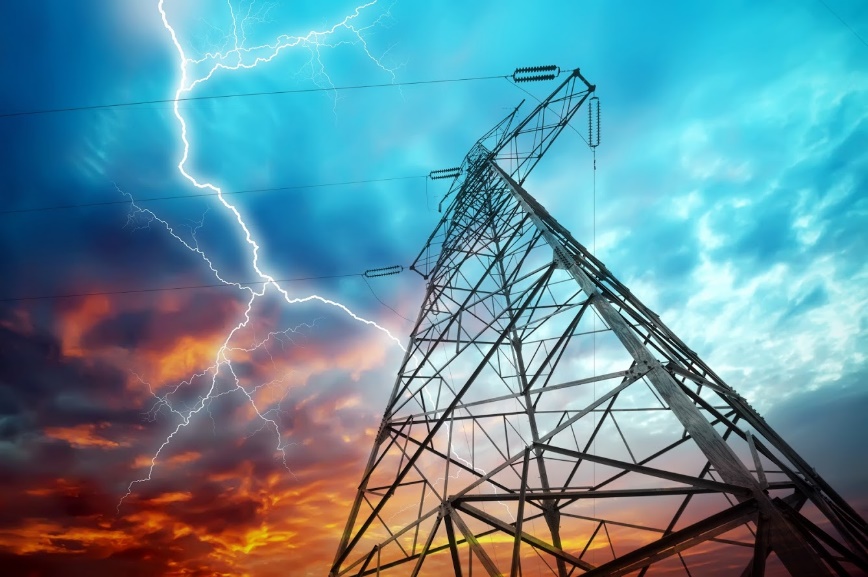If a storm, fallen tree, or vehicle collision causes your power pole, line, or roof mast to topple, you must be very careful to avoid electrocution. Here are five tips to remember when you face a power-pole drop or downed power line in your yard.
- Know the Signs of Power Pole Damage
When your home’s interior wiring is damaged or overloaded, circuit breakers in your main service panel will trip to stop electricity from flowing to the affected branch. You must find the problem, and then flip the breaker to restore power to that line.
On outdoor distribution lines, circuit breakers would be impractical. Devices called reclosers act as safety mechanisms when a power line is damaged. A recloser opens and closes the circuit through the power line several times to see if the problem — like a fallen tree branch — will resolve itself.
The recloser is the reason your power will seem to come back on several times before the power goes out all the way. The telltale flickers are a sign of nearby line damage.
Other signs of a dropped pole or mast on your property include:
- Arcing or sparks from lines
- Loud thud or bang
- Burning smell
- Visible power line on grass
- Fire in grass
- Crackling and buzzing sounds
If strong winds are blowing outside, the above sounds could indicate a fallen power pole or mast. The sounds may also occur with a lightning strike or vehicle collision on a power pole.
- Stay Inside If You Can’t See the Problem
If you suspect a car, tree, or wind gust has downed your power pole or mast, call your power company immediately. Shut off power to your inside breaker panel to protect your wiring in case the voltage surges from the line damage.
Try to visualize the downed power pole or line on your property from inside your home to determine if it’s safe to walk outdoors. Some ways to see the damage include:
- Go to upper floors and look out windows
- Call neighbors and ask what they see
- Use flashlights to illuminate damage
If you can’t see where the downed pole or line fell, remain indoors and wait for help. If you must exit the home due to fire or other emergency, use exits that are located on the opposite side of the house from the power lines. Go through a neighbor’s yard or use other detours to avoid contacting live wires.
- Use Extreme Caution Around Downed Lines
Your electricity provider has protective measures in place on their distribution lines to de-energize downed lines. However, the system is not fool-proof. Downed lines that are still energized can carry a few hundred to thousands of volts of power. Always assume that a downed line is live.
Voltage can be fatal even if you don’t touch a live power line directly. The electricity running through the lines always wants to go to the ground. High voltage will radiate in the earth around an energized line that is dropped across grass or another ground surface.
Remain at least 30 feet away from any downed power line to avoid electrocution. Don’t use a stick or any other tool to move lines off of buildings, cars, or driveways. Keep pets indoors and warn neighbors about any downed lines on your property.
- Don’t Drive Over a Downed Line
Your rubber car tires may protect you if you drive over a live electrical distribution line, but the line can quickly become entangled in your vehicle’s axle or wheels. The weight of your vehicle may pull lines down further, causing the line to fall on your vehicle.
Unless absolutely necessary, remain in your vehicle with windows and doors closed if a power line does fall on your car while you’re in it. Inside the vehicle, you’re safe. Once you step outside and touch the ground or your car, you can be killed by the voltage radiating through the ground or energizing the metal in your vehicle.
If your car is on fire and you must exit the vehicle to save your life, jump with both feet as far from the vehicle as possible. Don’t touch the car as you exit. Be careful not to stumble back into contact with the vehicle as you move at least 30 feet away from it. Warn others nearby to stay away from the area.
- Contact a Licensed Electrician When the Crisis Is Over
When power poles and masts drop, the forces exerted on lines often pull main breaker panels off of homes. The force of a dropped pole can also pull wires loose inside your home.
Electrical companies will repair damaged poles and lines, but they are generally not responsible for restoring private electrical service panels. If your main breaker panel and wiring are damaged by a downed power pole or mast, you must hire a professional licensed electrician to repair the damage.
Your electrical utility provider will inspect the electrician’s work before turning your power back on to your home. Make sure your home’s electrical work is performed correctly by calling A to Z Electric Co. after a power pole incident. We repair and replace damaged service panels and wiring throughout the Greater Chicagoland region.

